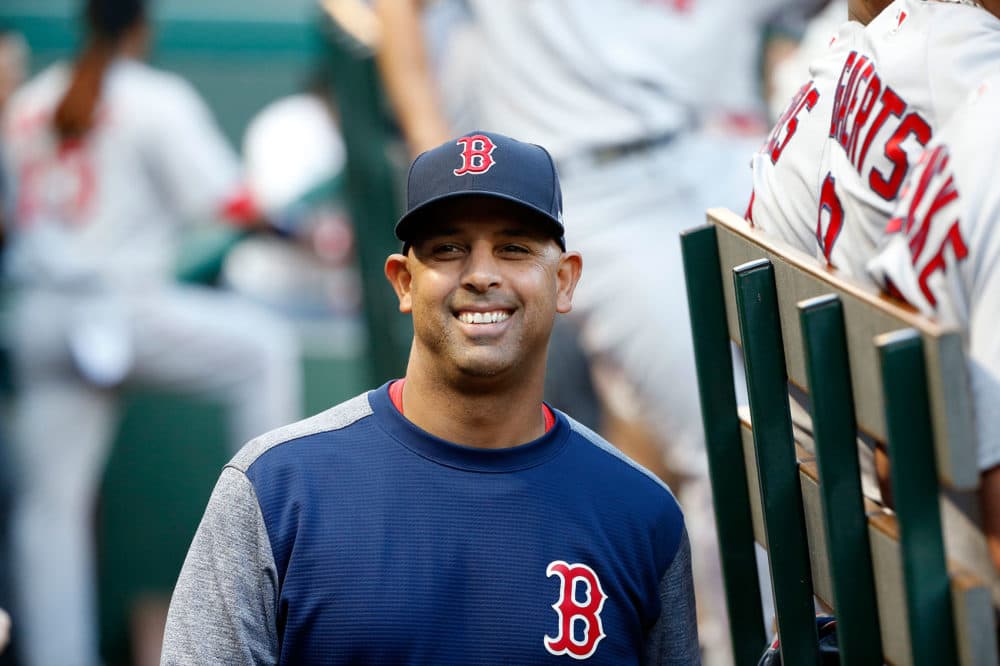Advertisement
What Red Sox Manager Alex Cora Says About His Team's Historic Season

Alex Cora doesn't like his Fenway Park office.
Not because it's awkwardly shoehorned between the Red Sox clubhouse and the players’ parking lot. Not because it’s barely big enough for a desk, a couple of file cabinets, couch, locker and mini-refrigerator that hums noisily. Not because all the other trappings remind the manager that he occupies one of the most pressure-packed jobs in the city. No, Cora explains, it’s much simpler than that.
“You play in college, you play minor league baseball then in the big leagues, and you’re always in that big room [the clubhouse] and there’s always people around,” Cora says. "All of a sudden, when you become a manager, it’s just the locker in the office. You feel like, ‘Where am I at?’ I feel very uncomfortable."
Cora, who at 42 isn't much older than some players, prefers to be in the clubhouse with them, talking, sitting down for a game of cards.
“There’s some good conversations when you’re in a relaxed environment,” he says. “Sometimes it’s better to talk baseball while we’re playing cards and where they are at as individuals when you are within their environment.”
Cora’s ability to communicate clearly and easily with players has become a hallmark of his historically successful first season as Red Sox manager. But communications skills alone don’t get you the best record in baseball and the most wins in franchise history (107 and counting). There’s also Cora’s ability to balance instinct and analytics, learn quickly on the job, and always keep the bigger picture in mind.
Although he'd rather have been in the clubhouse, Cora recently sat down on his office couch and talked about the Red Sox remarkable season, his managing philosophy and what awaits in the playoffs. On the wall behind him, crammed together in neat little rows, were pictures from every Boston win this season. Actually, the first 99 wins. That’s all that fit. Photos from the latest wins now take up space on a second wall.
“The cool thing is you go through it and you do remember the game,” says Cora of the photo display. “The walkoffs early in the season, David [Price] turning around his season, the walkoff by Benny [Andrew Benintendi] against the Yankees, the grand slam by Xander [Bogaerts], the grand slam by Mookie [Betts], then you’ve got David again and David again, which is great.”
But ask Cora for the defining moments of this Red Sox season and he doesn’t point out the big hits or the big pitching performances. The first “moment” he mentions is Game 6 of the season. It was the second game in a series against the Miami Marlins and Cora didn’t start Betts, who's since had an MVP-caliber season.
“We’d been talking about giving our guys off days and resting,” Cora says. “I think they didn't believe it like, ‘Aww, no, he’s just talking.’ Mookie didn’t start that game and everybody was like, ‘Whoa, this is serious.’ So then they understood that there's a big picture here and rest is very important.”
Advertisement
Cora also points to April 22 in Oakland, the day after A’s pitcher Sean Manaea threw a no-hitter against Red Sox.
“We didn’t play Mookie, we didn’t play [now-former Sox player] Hanley [Ramirez] just to tell them there’s a plan here,” Cora says. “And because we got no hit didn’t mean that we were going to play guys the next day because we were desperate to win. They got the message that there’s a bigger picture than just one day during the season.”
Part of that bigger picture includes the integration of analytics and the desire for Sox batters to be more aggressive. Cora’s happy with the progress on both fronts.
When asked if it’s hard to strike a balance between intuition and analytics with this group of players, Cora says, “No, it's not hard because at the end your baseball IQ takes over. And one thing I learned right away during the offseason just talking to them, they're bright. We're on the same page as far as like taking advantage of certain things that the game will give you. And they pay attention to the details and that's what I try to do, too.”
Cora adds that the organization is on the same page, too, and considers the success this season an “organizational effort” that stretches from the owners to the front office to the scouting department to the coaching staff. As Cora sees it, that contributes to the kind of chemistry necessary to be as consistent as the Red Sox have been. They haven’t had a losing streak longer than three games this season and that happened only three times.
“If we are not on the same page I feel that this [record-setting season] doesn't happen,” says Cora. “And they see it. That’s the thing. The players, they like to be GMs. They like to be managers. They like to be owners of the team. They know what’s going on. If they feel that we’re not on the same page, they’ll talk about it and it’s not good for the environment. So, one thing I want to make sure is we’re in this together. When we talk about analytics or base running or medical staff, I want to make sure they know that the decisions that we make, they’re made as a group.”
"We’re having a great season. I know everybody is talking about us, but they’re the ones. All the pressure is on [the Astros].”
Alex Cora, of the defending champs
Looking ahead to the playoffs, Cora and the Red Sox could easily find themselves facing the Houston Astros. Last year, the Astros won the World Series with Cora as their bench coach. So, what does he think of possibly facing his former team in the postseason? Not all that much, since the two teams have played each other seven times since May. But that didn’t stop Cora from a little gamesmanship.
“Obviously, October is going to be a lot different,” says Cora. “They’re the world champs, they’re defending champs. I know [Astros manager] A.J. [Hinch] hates when I say this, but they’re the ones. We’re having a great season. I know everybody is talking about us, but they’re the ones. All the pressure is on them.”
Still, after a such a dominant season, anything short of a World Series win would be disappointing for Red Sox Nation. And some baseball pundits wonder how the Sox will handle the weight of expectations, especially since they haven’t had any lengthy losing streaks, any late-season worries about making the postseason, any catastrophic injuries.
But don’t tell the manager that his team hasn’t been tested this season.
“Well, I think we've been tested daily,” says Cora. “That's the way we see it. I mean 162 games is very challenging, regardless if you have success or not. I know we haven't lost too many games in a row, whatever, blah, blah, blah. But I think to stay focused and show up every day, that's been a challenge for us. I know how people feel about it, but I know what we have. I know how we do it and I know how we feel about it.”
After seeing what’s happened on the field this season, it’s easy to understand why he’s sometimes called the next great baseball manager or viewed as the model for the next generation of baseball managers. His response?
“Nah,” says Cora, then laughs. “I don't consider myself a genius or a magician or whatever. I’m just a baseball guy that is surrounded by great people and we have a lot of talent here.”
This segment aired on October 5, 2018.
